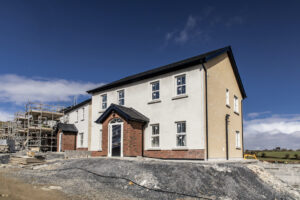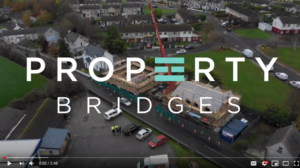Property Bridges is offering a solution to Ireland’s housing shortage and giving everyday savers the opportunity to earn better than average returns on their money.
The fundraising platform matches small developers looking to finance a construction project with ordinary investors.
The Property Bridges team consists of CEO and founder David Jelly, Michael Fitzpatrick, head of credit and portfolio management, and head of communications Marc Rafferty who came on board as an investor.
Mr Rafferty has been involved in lending platform for SMEs, Linked Finance, and previously car sharing service GoCar.
More than €100bn is held in Irish deposit accounts earning low-interest rates at a time when small developers struggle to get finance to build.
Mr Rafferty says Property Bridges creates a “win-win” situation.
“Pillar banks got stung in the downturn, and now while they’ll lend €100m to big construction companies, they won’t lend €1.5m to a small developer,” he says.
Property Bridges is ready to launch its first two loans to support a small project in Sandycove in Dublin, and a social housing project in Kilkenny.
The owner of the building in Sandycove is an architect who is constructing a mews dwelling to sell it on to an elderly couple who are downsizing.
“He’s looking to raise €450,000. It’s a perfect peer-to-peer loan: It has an exit strategy, and it’s got a timeframe,” Mr Rafferty says.
The developer in Kilkenny has invested in the site, and despite receiving deposits from Kilkenny County Council, he can’t get money to build.
“That’s a classic scenario going on all around the country at the moment,” Mr Rafferty says.
Property Bridges is looking to fill the gap for smaller loans that the banks aren’t interested in, typically €500,000 to €3m.
Our goal is to grow the platform over the next two years to 100 of these loans. And we’re looking for 10,000 lenders,” he says.
The borrower absorbs the 4% arrangement fee.
While the lender does have to bear some risk for a higher return, Property Bridges carries out a risk assessment in the same way a bank would and the loan to asset value required is around 60%.
Returns are expected to be around 8% to 9% but Mr Rafferty advises investors to diversify.
Even with a “normal” default rate of less than 1%, “if you’re making 9% return and you’re spreading the risk, you’re still making a pretty good return.
“As well as credit assessment, our lawyers are looking at construction schedules, budget milestones, facilities agreements, type of contractors in place, viability and value of the site,” according to Mr Rafferty.
The details of each project are supplied on the platform along with a summary of plans, and all other legal documents.
He says the lender is in control. “You chose what you want to invest in, whether it’s a local project, or social housing, or by return on investment.”
Property Bridges took part in the National Digital Research Centre accelerator programme earlier this year, receiving €50,000 in investment and supports.
And it has recently received backing from Enterprise Ireland for funding as a High Potential Start-Up.


